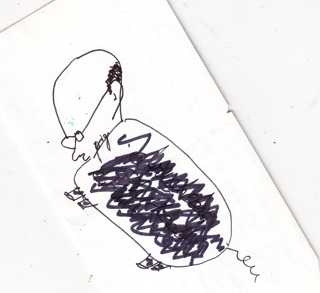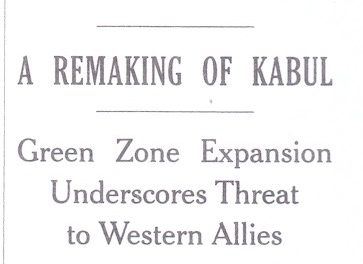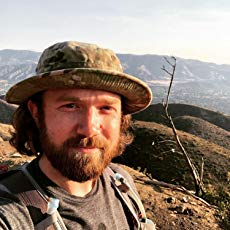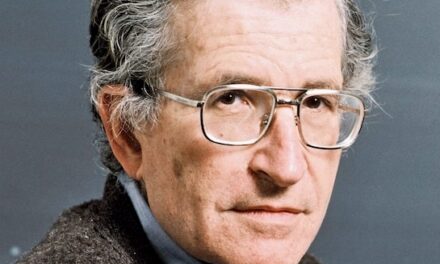Clara Bingham’s recently published oral history, “Witness to the Revolution,” includes a chapter on the trial of the “Chicago Eight” (reduced to seven after Black Panther leader Bobby Seale insisted that the court had no jurisdiction over him and he was bound, gagged, and hauled away). In a file cabinet unopened for years I found a folder marked 12/69 containing three teletyped Associated Press dispatches from the trial, and this droodle of Judge Julius Hoffman done when I was in his courtroom testifying.

Leonard Weinglass, a very good criminal defense lawyer, was trying to establish that police in Chicago had been intent on a riot occurring during Democratic Party convention. I testified that two cops had warned Tom Hayden, not in a friendly way, that the feds were planning an incitement-to-riot case against him.
I could truthfully affirm that I’d never seen Hayden and Abbie Hoffman et al conspire in the months preceding the convention to incite a riot. Their hope was for a large demonstration. I did see them plotting to lure “the kids” (Rennie Davis’s contemptuous term) to Chicago with false promises of Credence Clearwater Revival. But the prosecution didn’t ask about that.
This is from the AP dispatch by Tony Fuller:
“Gardner said that during the convention he was the editor of the Ramparts Wall Poster, a one-page newspaper which was circulated among the demonstrators. He said one of the defendants, Thomas Hayden, came to his office at 4 a.m. on August 26, 1968, and told him he had just been released from prison on bail.
“Gardner quoted Hayden as saying his ‘tail, Riccio and Bell, threatened to kill him.’ Frank Riccio has already testified in the trial that he is a Chicago policeman who was assigned to tail Hayden during the convention. Bell was not identified but was also reported to be a policeman.
“Gardner said Hayden told him he had ‘been told by Riccio and Bell that there was going to be an FBI cast against him for crossing state lines to incite a riot.’ It is on this charge that Hayden and the others are now on trial.
“Assistant US Attorney Richard Schultz objected that Gardner’s account of his conversation with Hayden was hearsay evidence. US District Judge Julius L. Hoffman ordered the defense to cease this line of testimony.
“Hoffman also warned Gardner against interjecting personal opinions into his testimony and added:
“’You look disturbed. You know you don’t have to testify.’
“Gardner said, “I feel ill at ease here.’
“’Well don’t be critical of me,’ Hoffman said. ‘I didn’t ask you to come here.
“Tuesday a member of the British Parliament testified she got mace in the face from a policeman when she tried to sing ‘We Shall Overcome.’”
Dave Dellinger, one of the defendants who was not into showboating, died long before Clara Bingham began her research. He didn’t describe himself as a pacifist, but everybody else did. Here’s Dellinger’s account of the famous “Conspiracy.” He describes an event I took part in but have no memory of whatsoever. What a drag it is getting old.
Chicago PS
I have two vivid memories of that trip, both involving sex, sort of
The defense paid my fare and I flew into O’Hare, arriving on the afternoon before I was supposed to testify. They put me up at an apartment on the South Side where Hayden and members of the defense legal team were staying for the duration of the trial. The pad had been put at their disposal by a University of Chicago grad named Bill Zimmerman, who someone described as “Tom’s gofer.” After dinner Hayden and Zimmerman were going out to a meeting and I was going to sleep. Zimmerman handed me a phone number on a slip of paper and said, in reference to one of the lawyers, “If Kinoy’s wife calls from New Jersey, tell her he’s just gone down for a quart of milk.” Then I was supposed to phone Kinoy at his girlfriend’s, so he could call his wife in New Jersey.
I had been betrayed myself, so I wasn’t about to be party to someone else’s betrayal. I told them I was tired and wouldn’t answer the phone. I should have said, “Why do you think I would lie for him, or you, or anybody?” But at the time I hadn’t split with them all the way.
Allen Ginsberg and Phil Ochs were supposed to testify after me. I remember being with the two of them in a large, dark room, adjacent to the courtroom. Ginsberg asked Ochs where he was staying. Ochs told him —a friend’s place or another defense pad, I can’t recall. Ginsberg asked if there was any room for him. Ochs said there wasn’t. Are you sure? Yes. Ginsberg asked if he could share Ochs’s bed. Ochs laughed it off. Ginsberg asked again. Ochs said no. Ginsberg asked again and again and again and again. Ochs was obviously embarrassed and so was I, a mere Zelig. I assumed Ochs was straight but what did it matter, no means no, and the come-on was relentless —and not very poetic.
I have only one distinct memory from my time on the witness stand. After I’d be asked a question on cross-examination, grinning Abbie Hoffman would cup his mouth with his hands and offer a word of silent advice: “Lie.”
The federal conspiracy charge was absurd, but Tom was crazed in Chicago during the convention, and would have incited a terrible riot if a sensible young lawyer working for Sen. Eugene McCarthy’s campaign had agreed to broadcast a tape from a window of the Hilton to the massed protesters across Michigan Avenue, in which Tom urged everyone to charge across the police line and confront the delegates in the hotel. Tom’s deep, sincere hope that we could change this country via the Democratic Party had been murdered when Bobby Kennedy was murdered in June.
(Who didn’t have that hope? I had rung doorbells for William Fitts Ryan and William Meyer —pro-disarmament, anti-HUAC Congressmen— and I’d written a speech for Teddy Weiss when he was on the New York City Council.)
The Kennedy family asked Jack Newfield to invite some “movement” organizers to stand by the coffin and he asked Tom and me.

Tom comes off looking good in “Witness to the Revolution.” Mark Rudd is very hard on himself. This is from Jon Wiener’s review in the New York Times:
“…What [Rudd] regrets most about the Weathermen is that ‘we destroyed S.D.S. at the height of the war.’ That happened, Tom Hayden emphasizes, before the Moratorium in October 1969, when two million people participated in the largest antiwar protest to date, and before the nationwide student strike against the war in May 1970. ‘There were many student uprisings to come,’ he says, but ‘the group that had triggered it . . . was actually dead. Unbelievable. And this was not seven years from the time when S.D.S. was formed.’
One could come away from Bingham’s oral history with the impression that there was a thriving organization called SDS that would have ended the war and gone about creating a democratic society if the crazy, bomb-making Weathermen hadn’t taken it over. But the Weathermen could never have had any sway if SDS was a functional organization with a coherent agenda. Why didn’t it evolve into a Movement for a Democratic Society (one doesn’t remain a student forever)? Why wasn’t prime mover Tom Hayden the up-front leader all along?
The new left was suspicious of leadership per se —which is absurd, because we’re herd animals and leadership is natural, and as anybody who has ever had a good boss and a complex task to accomplish knows, leadership is necessary. The good leader makes plans that take advantage of everybody’s strengths, and that are based on —and change according to— everyone’s input. If the plans fail, an up-front leader can be criticized and replaced, but a hidden leader retains control. In SDS you could ony be prez for one year, but Tom was really running things from behind the scenes through ’68. I was never a member but I went to their “Back to the Drawing Boards” Conference in Kalamazoo in June, ’67, with a suggestion that they set up coffeehouses in Army towns. No takers. At that point the classy lefties didn’t understand how many GIs opposed the war. (I had little kids, didn’t feature starting a place myself.)
I first met Tom in the summer of ’61 or ’62. We took a walk around the lake in Madison. Wisconsin. We talked about a Student Press Service that would send somebody from one of our papers (he was editor of the Michigan Daily, I was from the Crimson) to take a semester off and go cover the civil rights movement… I had driven up from Chicago with some guys involved with a journal called “New University Thought.” Tom told me to be cautious, “They’re Communists.” He was an admirer of James MacGregor Burns, who was predicting a realignment in which Liberal Republicans would become Democrats and Southern Democrats would become Republicans.
I met Casey Hayden, Tom’s ex, in Jackson Mississippi in the spring of ’64. She was with SNCC. I was in my dress greens, on a weekend pass from Fort Polk… When he was leaving Connie B. for Anne W. he confided, “I’ve been on both sides of leaving now…”
Tom and I had a close mutual friend in Jack Newfield, the Village Voice reporter. At Jack’s wedding to Jane Eisenberg, the rain stopped we played football and I threw a touchdown pass to Tom. And long before he met the famous actress who became his wife, I wrote a song called “I’m Jack Newfield” with this verse:
Joey Archer is Baby Blue
RFK of course Camus
Tom Hayden’s Carol Baker’s new guru
and I’m Jack Newfield…
Jack thought the world of Tom. His dream was to arrange a meeting at which Tom would politicize, his other idol, Bob Dylan. And he finally pulled it off —a dinner at the Greenwich Village home of a doctor named Ed Rothschild. According to Jack it was socially awkward. Hayden denounced the war at length while Dylan was silent and “morose.” Finally Dylan said he thought maybe that war would never end.
The last time I emailed him it was in response to an item in his “Democracy Journal” blog.: Barbara Lee was leading a Congressional effort to honor the Vietnam-era peace movement. I wrote him back:
“To regard oneself as having rendered great service to the revolution, to pride oneself on being a veteran, to disdain minor assignments while being quite unequal to major tasks, to be slipshod in work and slack in study. This is a tenth type of liberalism.”
Just kidding,
Fred
The next Democracy Journal declared Tom’s support for Hillary Clinton (over Bernie Sanders), and included a picture of Tom and Hillary looking happy and young in the ’70s. I thought back to our walk around the lake and Tom’s preoccupation with the Democratic Party. We had come full circle, indeed.




